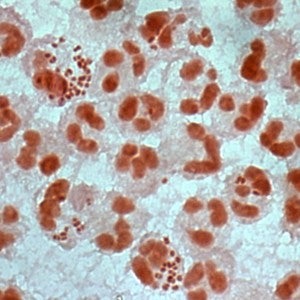Infectious Disease
About
 Research in Infectious Diseases at UVA provides rich interdisciplinary experiences in the molecular biology, immunology, cell biology, and pathogenesis of infectious diseases as well as vaccine development, therapeutics and diagnostic technologies for infectious agents. Trainees have opportunities to conduct research with over 30 different mentors from eight different departments
Research in Infectious Diseases at UVA provides rich interdisciplinary experiences in the molecular biology, immunology, cell biology, and pathogenesis of infectious diseases as well as vaccine development, therapeutics and diagnostic technologies for infectious agents. Trainees have opportunities to conduct research with over 30 different mentors from eight different departments
The Infectious Diseases (ID) Training Program is currently in its 5th decade of consecutive NIH funding. This program brings together an internationally recognized clinical program in infectious diseases and international health and superb basic molecular and cellular biologists. The core philosophy of the program is that interactions between basic scientists and clinicians in training and research will spark innovative approaches to diagnose, treat and prevent infections
A basic philosophy of the program is that through interactions of basic scientists and clinicians in research and training, will come the breakthrough science that leads to new interventions to diagnose, treat and prevent infections.
The Infectious Diseases Training Program features side-by-side education of predoctoral students, M.D.s, and Ph.D. postdoctoral fellows. Training is enriched by research-in-progress sessions, seminar series, and journal clubs that integrate both clinical and basic research aspects of infectious diseases.
The Global Biothreats Training Program focuses on the ways that key infectious agents of worldwide notoriety cause disease. Resources for this program include a well-equipped Biosafety Level 3 facility for trained and approved users. The Global Biothreats Training Program features coursework and lectures that highlight not only mechanisms of pathogenesis, but also the regulatory, policy, and societal impacts of global biothreats.
Faculty
Brown, Michael G.
Natural Killer Cells, Viral Immunity, Genetic basis of host resistance to viral infection, Tumor immunity, Immune cell regulation
Cai, Chuanxi
Molecular Physiology and Biological Physics
Casanova, James E.
Role of Arf family GTPases in vesicular transport and cytoskeleton assembly.
Cell Biology of bacterial pathogenesis.
The innate immune response to bacterial infection.Cliffe, Anna
Herpes Simplex Virus Infection of Neurons
Columbus, Linda
Biophysical Chemistry: Membrane protein structure, function, and dynamics
Cowardin, Carrie A.
The maternal and infant microbiome in childhood growth and immunity
Criss, Alison K.
Cellular and molecular mechanisms of Neisserial pathogenesis
Derre, Isabelle
Host/pathogen Interaction - Chlamydia Infection
Dremel, Sarah
Herpesvirus gene expression & RNA biology
Egelman, Edward H.
Structure and Function of Macromolecular Complexes Using Electron Microscopy
Engel, Daniel A.
Drug Discovery and Molecular Biology of Pathogenic RNA viruses: Ebola, SARS-CoV-2, Influenza and Zika
Ewald, Sarah E
Innate immunity, chronic disease, host-parasite interactions, Toxoplasma gondii, proteomics
Gahlmann, Andreas
Super-resolution fluorescence imaging of bacterial cells
Garcia-Blanco, Mariano A.
RNA-protein interactions in antiviral immunity and autoimmune diseases.
Guler, Jennifer
Mechanisms of Genetic and Metabolic Adaptation in the Malaria Parasite, Plasmodium falciparum
Hahn, Young S.
Immune regulation for HCV infection and chronic liver inflammation
Hammarskjold, Marie-Louise
Post Transcriptional Gene Regulation and the Molecular Biology of Human Retroviruses
Harris, Tajie H.
Immune response to infectious disease in the CNS
Hughes, Molly A.
Biodefense and emerging pathogens
Kedes, Dean H.
Human Herpes virus associated with malignancy, including Kaposi's Sarcoma
Kendall, Melissa M.
Bacterial cell signaling, host-pathogen interactions, intestinal pathogens
Laurie, Gordon W.
Restoration of Homeostasis in Disease
Newman, Laura Elizabeth
Mitochondrial regulation of innate immune and antiviral signaling
Papin, Jason
Systems biology, infectious disease, cancer, toxicology, metabolic engineering
Petri, William A
Immune mechanisms of defense against COVID-19 and enteric (diarrheal) infections
Ramakrishnan, Girija
Microbial Pathogenesis
Rekosh, David M.
Human Immunodeficiency Virus Gene Expression; Human Endogenous Viruses; SARS-CoV-2 Protein Trafficking; Post-transcriptional Gene Regulation
Spencer, Brady
Gram-positive pathogenesis; type VII secretion; impact of secreted effectors on host-pathogen interactions and immune responses
Sun, Jie
Viral immunology, T cells, Macrophages, Tissue repair
Swami, Nathan
Molecular and bioelectric devices; tissue regeneration.
Tamm, Lukas K.
Biomembrane Structure and Function; Cell Entry of Enveloped Viruses; Neurosecretion by Exocytosis; Structure of Bacterial Pathogen Membrane Proteins; Lipid-Protein Interactions
Taylor, Justin J
B cell Analysis and Engineering
Vande Pol, Scott B.
How Viruses, Particularly Papillomaviruses, Can Cause Cancer
Woodfolk, Judith A.
The immune response to common cold and allergens in health and disease.
Xie, Jinghang
Molecular Imaging; Cancer Immunology; Vaccines; Antibiotic Resistance.
Zeichner, Steven L.
Pathogenesis of infectious diseases and the development of new therapies and vaccines for infectious diseases and cancers.
Zimmer, Jochen
Transport of biopolymers across biological membranes with a particular interest in polysaccharide and protein translocation.
Zimring, James C
Alloimmunity in Transfusion and Transplantation , Oxidant Stress Biology in Health and Disease
